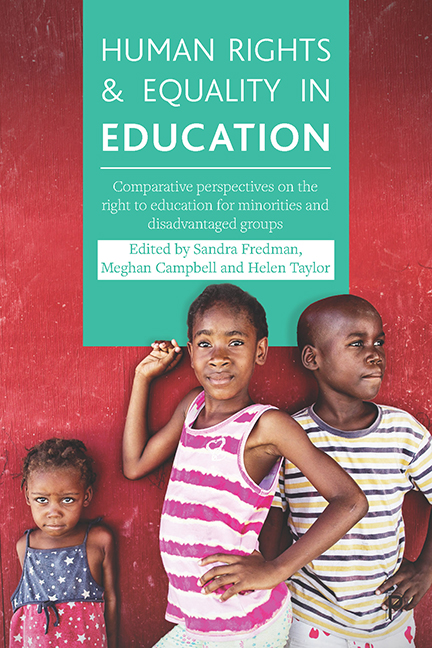 Human Rights and Equality in Education
Human Rights and Equality in Education Book contents
- Frontmatter
- Contents
- Notes on contributors
- Foreword
- Human rights and equality in education: Introduction
- Part I The role of public and private actors in education
- Part II Balancing the right to freedom of religion and culture and the right to education
- Part III Gender equality in education: moving beyond access to primary education
- Part IV Litigating for quality and equality in education
- Index
three - Education at the margins: the potential benefits of private educational initiatives for disadvantaged groups
Published online by Cambridge University Press: 19 April 2022
- Frontmatter
- Contents
- Notes on contributors
- Foreword
- Human rights and equality in education: Introduction
- Part I The role of public and private actors in education
- Part II Balancing the right to freedom of religion and culture and the right to education
- Part III Gender equality in education: moving beyond access to primary education
- Part IV Litigating for quality and equality in education
- Index
Summary
Introduction
Early morning in a messy, industrial zone of Johannesburg, children cross a disused park in yellow, green and grey t-shirts towards a big building that still looks like an old factory on their way to a colourful school sign that reads Jeppe Park Primary.The area is known as Jeppestown – one of the oldest neighbourhoods in the city. It suffers from high rates of crime and a lack of investment in infrastructure. The streets are full of litter. The buildings mostly house car-parts dealers. Fires often break out in the trash-heaps in the park. It is not a friendly place for children.
Like so many sites of rapid urbanisation in Africa, this is exactly where families typically live as parents from rural areas move to cities in search of jobs. Children here stay in abandoned warehouse spaces – where big floor sections are divided off from other families by scraps of fabric to create informal sleeping areas. Sometimes children will live in overcrowded apartments with sub-tenants crowding into the communal areas. Finding schools for children in areas such as Jeppestown is extremely difficult. Gauteng, the province in which Johannesburg is located, suffered a school shortage that resulted in 58,000 learners without a school to attend at the beginning of the school year in 2017. At the closest local public school in Jeppestown, the waiting list in Grade 1 runs to over 222 pupils. They had to be turned away at the beginning of the school year in 2016. The public system is simply not able to meet the needs of learners and ensure access to school for all.
The children in the colourful t-shirts crossing the park are an exception to these statistics. They enter the glass doors of the factory building and enter into a beautiful educational facility. Two years before, the school was a disused industrial space – blacked out and broken windows, cold concrete floors and broken lights. Now, it is a school that contains indoor slides, play-walls, purpose-built classrooms, fantasy corners, a dining hall, an auditorium and a playground. It is a school run by a Streetlight Schools, a non-profit organisation aiming to address the lack of access to quality education for learners in South Africa.
- Type
- Chapter
- Information
- Human Rights and Equality in EducationComparative Perspectives on the Right to Education for Minorities and Disadvantaged Groups, pp. 45 - 54Publisher: Bristol University PressPrint publication year: 2018


